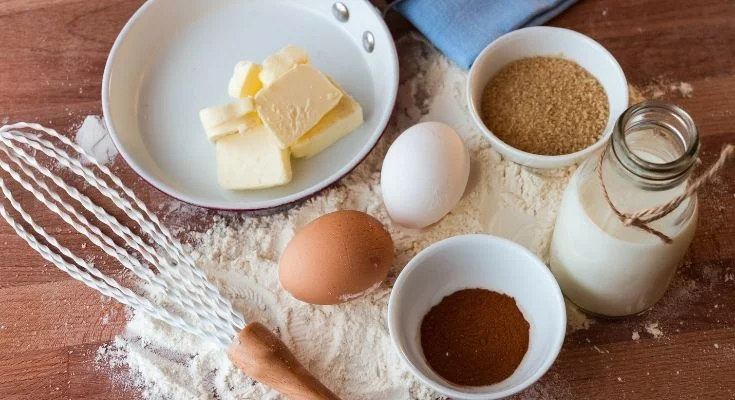When it comes to baking, eggs are a common ingredient that can be found in many recipes. However, for those who follow a vegan diet, have egg allergies, or simply don’t have eggs on hand, it can be a challenge to find suitable substitutes.

Why Use Egg Substitutes in Baking
Eggs are often used in baking to add moisture, structure, and richness to the final product. They also help to bind the ingredients together and provide aeration to the batter or dough. However, not everyone can or wants to use eggs in their baking, and that’s where egg substitutes come in.
Vegan Diet
For those following a vegan diet, eggs are not an option as they come from animals. Using egg substitutes allows vegans to enjoy baked goods without compromising their dietary restrictions.
Egg Allergy
Some people have an egg allergy, which means their immune system reacts to the proteins in eggs. In these cases, using egg substitutes is necessary to avoid potentially life-threatening allergic reactions.
Lack of Eggs
Lastly, sometimes you may simply run out of eggs or not have them on hand. In these cases, using an egg substitute can save the day and allow you to continue baking.
Best Egg Substitutes for Baking
There are several options for egg substitutes when it comes to baking, each with its unique properties and uses. Here are some of the best egg substitutes and how to use them in baking:
1. Applesauce
Applesauce is a popular egg substitute in vegan baking as it adds moisture and sweetness to the recipe. It works best in recipes that call for one or two eggs, such as muffins, pancakes, and quick bread.
2. Banana
Mashed ripe bananas can be used in place of eggs in recipes that call for up to two eggs. They add moisture and sweetness to the recipe and work well in baked goods like pancakes, muffins, and cakes.
3. Silken Tofu
Silken tofu is a great substitute for eggs in recipes that call for a lot of moisture, such as custards, puddings, and pies. It adds a creamy texture to the recipe and can be blended with other ingredients to create a smooth batter.
4. Yogurt
Yogurt can be used as an egg substitute in recipes that call for one or two eggs. It adds moisture and a tangy flavor to the recipe and works well in muffins, cakes, and quick bread.
5. Vinegar and Baking Powder
A mixture of vinegar and baking powder can be used in place of eggs in recipes that call for up to two eggs. This mixture adds a lightness and airiness to the recipe and works well in cakes, cupcakes, and cookies.
6. Aquafaba
Aquafaba is the liquid leftover from cooking chickpeas or other legumes. It can be whipped like egg whites and used as a substitute in recipes that call for egg whites. It works well in meringues, macarons, and cakes.
Tips for Using Egg Substitutes
When using egg substitutes in baking, there are a few tips to keep in mind to ensure success:
1. Follow the Recipe
Always follow the recipe and use the suggested egg substitute amount. Substituting too much or too little can result in a different texture and flavor.
2. Experiment
Experiment with different egg substitutes to find the one that works best for the recipe you are making.
3. Be Mindful of Flavors
Some egg substitutes, Some egg substitutes, such as applesauce and mashed bananas, can add a distinct flavor to the final product. Be mindful of this and use substitutes that complement the recipe’s flavors.
4. Adjust Baking Time and Temperature
Egg substitutes can affect the baking time and temperature of the recipe. Keep an eye on the baked goods while they are in the oven and adjust the time and temperature if needed.
5. Use Binders
Some egg substitutes, such as applesauce and mashed bananas, may not provide the same binding properties as eggs. Use additional binders like flour, cornstarch, or ground flaxseed to ensure the recipe stays together.
FAQs
While most baking recipes can be adapted to use egg substitutes, some may not work as well as others. It’s best to experiment and find the substitute that works best for your recipe.
It depends on the substitute being used. In general, 1/4 cup of applesauce or mashed bananas can replace one egg, while 1/4 cup of silken tofu can replace one egg. Always follow the recipe and use the suggested amount of substitute.
While some substitutes, like aquafaba, can replace multiple eggs, it’s best to experiment and find the substitute that works best for the recipe.
Yes, using egg substitutes can change the texture and flavor of the final product. Experiment with different substitutes to find the one that works best for your recipe.
While egg substitutes are often used in sweet baked goods, they can also be used in savory dishes like quiches and frittatas. Experiment and find the substitute that works best for your recipe.
Conclusion
Egg substitutes can be a great alternative for those who cannot or choose not to use eggs in their baking. From applesauce to aquafaba, there are plenty of options available to suit different recipes and preferences. By following these tips and experimenting with different substitutes, you can enjoy delicious baked goods without eggs.
